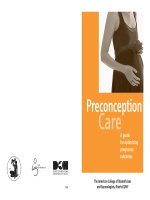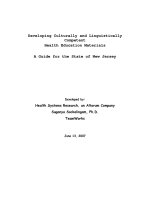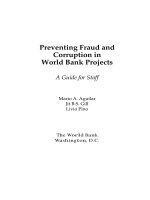reading like a writer a guide for people who love books and for those who want to write them (p.s.)
Bạn đang xem bản rút gọn của tài liệu. Xem và tải ngay bản đầy đủ của tài liệu tại đây (3.68 MB, 291 trang )
NEW
YORK
TIMES
BESTSELLER
FRANCINE PROSE
1
READING
1
A
WK1
1
WH
LIKE
1
j
|\
'GtfF
\
O
LOVE BOOKS AND
:
<
FOR
THOSE WH.
C/3
.
TO WRITE THEM
<M>
ADVANCE
PRAISE
FOR READING
LIKE
A
WRITER
"The
trick
to writing, Prose writes, is
reading—carefully,
deliberately, and slowly.
While this might seem like a no-brainer, Prose masterfully meditates on how
quality reading informs great writing, which will warm the
cold,
jaded hearts
of
even the most frustrated, underappreciated, and unpublished writers. . . .
Prose's
guide to reading and writing belongs on every writer's bookshelf
along-
side
E. M. Forster's
Aspects
of
the
Novel."—Publishers
Weekly
(starred review)
PRAISE
FOR FRANCINE PROSE
"Francine Prose is one of
a
handful
of
truly
indispensable American
writers."—Gary
Shteyngart
"Prose
has been steadily producing
novels,
short
stories,
and criticism shot
through
with
corrosive wit and searing
intelligence."—Scott
Spencer
"One
of
our finest
writers."—Larry
McMurtry
ISBN-13
978-0-06-077704-3
ISBN-10
0-06-077704-4
USA
$23.95
Canada
$29.95
L
ong
before there were creative-writing workshops
and degrees, how did aspiring writers learn to
write? By reading the work of their predecessors and
contemporaries,
says
Francine
Prose.
In
Reading Like a
Writer,
Prose invites you to sit by
her side and take a guided
tour
of the tools and the
tricks of the masters. She reads the work of the very
best
writers—Dostoyevsky,
Flaubert, Kafka, Austen,
Dickens,
Woolf,
Chekhov—and
discovers why their
work has endured. She takes pleasure in the long and
magnificent
sentences of Philip Roth and the
breath-
taking
paragraphs
of
Isaac
Babel;
she
is
deeply moved by
the brilliant characterization in George Eliot's Middle-
march.
She looks to John Le Carré for a
lesson
in how to
advance
plot
through dialogue, to Flannery O'Connor
for
the cunning use of the telling detail, and to James
Joyce
and Katherine
Mansfield
for clever examples of
how to employ gesture to create character. She cautions
readers
to slow down and pay attention to words, the
raw material out
of
which literature is crafted.
Written
with
passion, humor, and wisdom, Reading
Like a
Writer
will inspire readers to
return
to literature
with
a fresh eye and an eager heart.
0906
FRANCINE
PROSE
is the author of fourteen
books of fiction, including, most recently, A Changed
Man and Blue
Angel,
which was a finalist for the Na-
tional Book Award. She has taught literature and
writ-
ing
for more than
twenty
years at major universities
such as Harvard, Iowa, Columbia, Arizona, and the
New School. She is a distinguished critic and essayist.
Prose
lives in New York City.
Jacket design by Roberto de Vicq de
Cumptich
Jacket photographs © Photodisc/Getty Images;
Ryan
McVay /
Getty
Images.
Author
photograph © 2006 by
Lisa
Yuskavage
Available
from HarperCollins e-books
Visit www.AuthorTracker.com for exclusive
information on your favorite HarperCollins authors.
HarperCollmsPublishers
www.harpercollins.com
READING
Like
a
WRITER
FICTION
A
Changed
Man
Blue
Angel
Guided Tours
of
Hell
Hunters
and Gatherers
The
Peaceable
Kingdom
Primitive
People
Women and Children
First
Bigfoot
Dreams
Hungry
Hearts
Household
Saints
Animal Magnetism
Marie
Laveau
The Glorious Ones
Judah
the
Pious
NONFICTION
Caravaggio:
Painter
of
Miracles
Gluttony
Sicilian
Odyssey
The Lives
of
the Muses:
Nine
Women and the Artists
They
Inspired
FOR
YOUNG
ADULTS
After
FOR
CHILDREN
Leopold,
the Liar
of
Leipzig
The Demons' Mistake:
A
Story
from
Chelm
You Never Know:
A
Legend
of
the Lamed-vavniks
The Angel's Mistake:
Stones
of
Chelm
Dybbuk:
A
Story
Made
in
Heaven
Like
a
WRITER
A
Guide
for
People
Who
Love
Books
and
for
Those
Who
Want
to Write Them
FRANCINE
PROSE
HârperCoMinsPublisbers
READING
LIKE
A WRITER.
Copyright © 2006 by Francine Prose. All rights reserved.
Printed in the United States of America. No
part
of this
book
may be used or repro-
duced in any manner whatsoever
without
written
permission
except
in the case of
brief
quotations embodied in critical articles and reviews. For information, address
HarperCollins Publishers, 10 East
53rd
Street, New York, NY
10022.
HarperCollins books may be purchased for educational, business, or
sales
pro-
motional use. For information, please write: Special Markets
Department,
HarperCollins Publishers,
10
East
53rd
Street, New York, NY
10022.
Grateful acknowledgment is made to the following for permission to reprint from
previously published material:
Jane
Bowles,
Two
Serious
Ladies.
Reprinted by permission of Peter
Owen
Publishers,
London; Gustave Flaubert, A
Sentimental
Education.
Translated by Robert Baldick.
Published by Penguin. Reprinted by Permission of David
Higham
Associates;
David Gates, The
Wonders
of the
Invisible
World,
pages
164-165.
Copyright © 1999
David Gates. Reprinted by permission of Alfred A. Knopf, a division of Random
House, Inc.; Henry Green,
Loving.
Published by Vintage. Reprinted by permission
of
The Random House
Group
Ltd.; Zbigniew
Herbert,
"Five Men" from
Selected
Poems
of Zbigniew
Herbert.
Edited and translated by Czeslaw Milosz and Peter
Dale Scott. English translation copyright © 1968 Czeslaw Milosz and Peter Scott.
Introduction copyright © A. Alvarez. Reprinted by permission of HarperCollins
Publishers;
Vladimir Nabokov,
Lectures
on Russian
Literature.
Copyright © 1981
Estate of Vladmir Nabokov. Reprinted by permission of Harcourt, Inc. All
rights reserved; Vladimir Nabokov, Lolita. Copyright © 1955 Vladimir Nabokov.
Reprinted by permission of the Estate of Vladimir Nabokov. All rights reserved;
Flannery
O'Connor,
Wise
Blood.
Copyright © 1962 Flannery O'Connor. Copyright
renewed 1990 by Regina O'Connor. Reprinted by permission of Farrar, Straus
and Giroux,
LLC;
Juan
Rulfo,
Pedro
Paramo.
Translated by Lysander Kemp, pages
251-25
A.
Published by Grove
Press.
Reprinted by permission of
Grove/Atlantic
Inc;
Scott Spencer, A Ship
Made
of
Paper,
pages
273-283
and
264-267.
Copyright ©
2003
Scott Spencer. Reprinted by permission of HarperCollins Publishers.
Designed
by Sarah Maya
Gubkin
Library
of Congress
Cataloging-in-Publication
Data
Prose,
Francine
Reading
like a writer : a guide for people who love books and for those who want
to
write
them
/ Francine
Prose.—1st
ed.
p. cm.
ISBN-13:
978-0-06-077704-3
ISBN-10:
0-06-077704-4
1.
English
language—Rhetoric.
2. Creative Writing. 3.
Authors—Books
and
reading.
4. Prose,
Francine—Books
and reading. I. Title.
PE1408.P774
2006
808'.
02—dc22
2005058457
06 07 08 09 10
ID/RRD
10 9 8 7 6
This
book
is dedicated to my
teachers:
Monroe Engel,
Alberta
Magzanian,
and Phil Schwartz.
ONE:
Close
Reading
1
TWO:
Words
13
THREE:
Sentences
35
FOUR:
Paragraphs
63
FIVE:
Narration
85
six:
Character
109
SEVEN:
Dialogue
143
EIGHT:
Details
193
NINE:
Gesture
209
TEN:
Learning
from
Chekhov
233
ELEVEN:
Reading
for
Courage
249
Books
to
Be
Read
Immediately
269
Acknowledgments
215
Like
a
WRITER
Close Reading
CAN CREATIVE WRITING BE TAUGHT?
It's
a reasonable question, but no matter how often I've been
asked
it, I never know quite what to say. Because if what people
mean
is:
Can the love of
language
be taught? Can a gift for story-
telling
be taught? then the answer is no. Which may be why the
question is so often asked in a skeptical tone implying
that,
un-
like
the multiplication tables or the principles of auto mechanics,
creativity
can't be transmitted from teacher to student. Imagine
Milton enrolling in a graduate program for help
with
Paradise
Lost,
or Kafka enduring the seminar in which his classmates in-
form him
that,
frankly, they just don't believe the part about the
guy
waking up one morning to
find
he's a giant bug.
What
confuses me is not the sensibleness of the question but
the fact
that
it's being asked of a writer who has taught writing,
on and off, for almost twenty
years.
What
would it say about me,
my students, and the hours we'd spent in the classroom if I
said
that
any
attempt
to teach the writing of fiction was a complete
2
Francine
Prose
waste of time? Probably, I should just go ahead and admit
that
I've been committing criminal fraud.
Instead I answer by recalling my own most valuable experi-
ence, not as a teacher but as a student in one of the few
fiction
workshops I took. This was in the
1970s,
during my brief career
as
a graduate student in medieval
English
literature, when I was
allowed the indulgence of taking one fiction
class.
Its generous
teacher showed me, among other things, how to line edit my
work. For any writer, the ability to look at a sentence and see
what's superfluous,
what
can be altered, revised, expanded, and,
especially,
cut, is essential. It's satisfying to see
that
sentence
shrink, snap into place, and ultimately emerge in a more polished
form: clear, economical, sharp.
Meanwhile, my classmates were providing me
with
my first
real
audience. In
that
prehistory, before mass photocopying en-
abled students to distribute manuscripts in advance, we read our
work aloud.
That
year, I was beginning
what
would become my
first
novel. And
what
made an important difference to me was
the attention I felt in the room as the others listened. I was en-
couraged
by their eagerness to hear more.
That's the experience I describe, the answer I
give
to people
who ask about teaching creative writing: A workshop
can
be use-
ful.
A good teacher can show you how to edit your work. The
right
class
can form the
basis
of a community
that
will help and
sustain
you.
But
that
class,
as helpful as it was, was not where I learned
to write.
LIKE
most—maybe
all—writers,
I learned to
write
by writing
and, by example, by reading books.
Long
before the idea of a writer's conference was a glimmer
in anyone's eye, writers learned by reading the work of their
READING
LIKE
A WRITER 3
predecessors.
They studied meter
with
Ovid,
plot
construction
with
Homer, comedy
with
Aristophanes; they honed their prose
style
by absorbing the lucid sentences
of
Montaigne and Samuel
Johnson.
And who could have asked
for
better
teachers: gener-
ous,
uncritical, blessed
with
wisdom and genius, as endlessly for-
giving
as only
the
dead can be?
Though writers have learned from
the
masters
in a
formal,
methodical
way—Harry
Crews
has
described taking apart
a
Graham Greene novel
to
see how many chapters
it
contained,
how much
time
it
covered,
how
Greene handled pacing, tone,
and point
of
view—the
truth
is
that
this sort
of
education more
often involves
a
kind
of
osmosis. After I've
written
an,essay
in
which I've quoted
at
length from great writers, so
that
I've had
to
copy
out
long
passages
of
their work, I've noticed
that
my own
work becomes, however briefly, just
a
little more fluent.
In
the
ongoing process
of
becoming
a
writer,
I
read and
re-
read
the
authors
I
most loved.
I
read
for
pleasure, first,
but
also
more analytically, conscious
of
style,
of
diction,
of how sen-
tences were formed and information was being conveyed,
how
the writer was structuring
a
plot,
creating characters, employing
detail and dialogue. And as
I
wrote,
I
discovered
that
writing, like
reading,
was done one word
at a
time, one punctuation
mark
at a
time.
It
required
what
a
friend
calls
"putting
every word
on
trial
for
its
life":
changing
an
adjective, cutting
a
phrase, removing
a
comma, and
putting
the
comma back in.
I
read
closely,
word by word, sentence
by
sentence, ponder-
ing
each deceptively minor decision
the
writer
had
made.
And
though
it's
impossible
to
recall every source
of
inspiration
and
instruction,
I
can remember
the
novels and stories
that
seemed
to
me
revelations: wells
of
beauty and pleasure
that
were
also
textbooks, private lessons
in the art of
fiction.
This book is intended partly
as a
response
to
that
unavoid-
able question about how writers learn
to do
something
that
can-
4
Francine
Prose
not be taught.
What
writers know is
that,
ultimately, we learn to
write by practice, hard work, by repeated trial and error, success
and
failure, and from the books we admire. And so the book
that
follows represents an effort to recall my own education as a
novelist
and to help the passionate reader and would-be writer
understand how a writer reads.
WHEN I was a high school junior, our
English
teacher
assigned
a
term
paper on the
theme
of blindness in Oedipus Rex and
King
Lear.
We were supposed to go through the two tragedies
and
circle every reference to
eyes,
light, darkness, and vision,
then
draw some conclusion on which we would base our final
essay.
It all seemed sa dull, so mechanical. We felt we were way
beyond it.
Without
this tedious, time-consuming exercise, all of
us
knew
that
blindness played a starring role in
both
dramas.
Still,
we liked our
English
teacher, and we wanted to please
him. And searching for every relevant word
turned
out to have an
enjoyable
treasure-hunt aspect, a Where's Waldo detective thrill.
Once we started looking for
eyes,
we found
them
everywhere,
glinting
at us, winking from every page.
Long
before the blinding of Oedipus or Gloucester, the lan-
guage
of vision and its opposite was preparing us, consciously or
unconsciously,
for those violent mutilations. It asked us to con-
sider
what
it meant to be clear-sighted or obtuse, shortsighted
or prescient, to heed the
signs
and warnings, to see or deny
what
was
right in front of one's
eyes.
Teiresias, Oedipus, Goneril,
Kent—all
of
them
could be defined by the sincerity or
falseness
with
which they mused or ranted on the subject of literal or
metaphorical blindness.
It was fun to trace those patterns and to make those connec-
tions.
It was like cracking a code
that
the playwright had embed-
READING
LIKE
A WRITER
ded in the
text,
a
riddle
that
existed just for me to decipher.
I
felt
as
if I
were engaged in some intimate communication
with
the
writer, as
if
the ghosts
of
Sophocles and Shakespeare had been
waiting patiently all those centuries for
a
bookish sixteen-year-
old
to come along and find them.
I
believed
that
I was learning to read in a whole new way. But
this was only partly true. Because in fact I was merely relearning
to read in an old way
that
I
had learned, but forgotten.
We all begin as close readers. Even before we learn to read,
the process
of
being read aloud to, and
of
listening,
is
one
in
which we are taking in one word after another, one phrase
at a
time, in which we are paying attention to whatever each word or
phrase is transmitting.
Word
by word is how we learn to hear and
then read, which seems only fitting, because
it
is how the books
we are reading were written in the first place.
The more we read, the faster we can perform
that
magic
trick of seeing how the letters have been combined into words
that
have meaning. The more we read, the more we compre-
hend, the more likely we are
to
discover new ways
to
read,
each
one tailored to the reason why we are reading a particular
book.
At first, the thrill
of
our own brand-new expertise is all we
ask
or expect from Dick and
Jane.
But soon we begin to ask what
else
those marks on the page can
give
us. We begin to want in-
formation, entertainment, invention, even
truth
and beauty. We
concentrate, we skim, we skip words, put down the book and
daydream,
start over, and reread. We finish a book and return to
it years later to see what we might have missed, or the ways in
which time and age have affected our understanding.
As
a child, I was drawn to the works of the great escapist chil-
dren's
writers.
I
liked trading my familiar world for the London
of
the four children whose nanny parachuted into their lives
with
her umbrella and who turned the most routine shopping
trip
into
6
Francine
Prose
a
magical outing. I would
gladly
have followed the
White
Rabbit
down into the rabbit hole and had tea
with
the Mad
Hatter.
I
loved novels in which children stepped through
portals—a
gar-
den door, a
wardrobe—into
an alternate universe.
Children love the imagination,
with
its kaleidoscopic pos-
sibilities
and its protest against the way
that
children are always
being told exactly
what's
true
and what's
false,
what's real and
what's illusion. Perhaps my taste in reading had something to
do
with
the limitations I was discovering, day by day: the brick
walls
of time and space, science and probability, to say nothing
of
whatever messages I was picking up from the culture. I liked
novels
with
plucky heroines like Pippi
Longstocking,
the astrin-
gent Jane Eyre, and the daughters in Little
Women,
girls
whose re-
sourcefulness
and intelligence don't automatically exclude
them
from the pleasures of male attention.
Each
word of these novels was a yellow brick in the road
to Oz. There were chapters I read and reread so as to repeat
the dependable, out-of-body sensation of being
somewhere
else.
I
read addictively, constantly. On one family vacation, my father
pleaded
with
me to close my book long enough to look at the
Grand Canyon. I borrowed stacks of books from the public li-
brary:
novels, biographies, history, anything
that
looked even
remotely
engaging.
Along
with
pre-adolescence
came a more pressing desire for
escape.
I read more widely, more indiscriminately, and mostly
with
an interest in how far a book could take me from my life
and how long it could keep me there: Gone
With
the
Wind,
Pearl
Buck,
Edna Ferber, fat bestsellers by
James
Michener,
with
a dash
of
history sprinkled in to cool down the steamy love scenes be-
tween the Hawaiian
girls
and the missionaries, the
geishas
and
the
GIs.
I
also
appreciated these books for the often misleading
nuggets
of information they provided about sex in
that
innocent
era,
the
1950s.
I
turned
the pages of these page-turners as fast as
READING LIKE A WRITER
I
could. Reading was like eating alone,
with
that
same element
of
bingeing.
I
was fortunate to have good teachers, and
friends
who were
also
readers. The books I read became more challenging, bet-
ter
written,
more substantial: Steinbeck, Camus, Hemingway,
Fitzgerald,
Twain, Salinger, Anne Frank. My friends and I, little
beatniks, were passionate fans of Jack Kerouac, Allen Ginsberg,
Lawrence Ferlinghetti. We read Truman Capote, Carson
McCullers, and the
proto-hippie
classics
of Herman Hesse,
Carlos
Castaneda—Mary
Poppins
for people who
thought
they'd
outgrown the flying nanny. I
must
have been vaguely aware of
the
power
of language, but only dimly, and only as it applied to
whatever effect the book was having on me.
A
L L
of
that that
changed
with
every
mark
I made on the pages of
King
Lear
and
Oedipus
Rex.
I still have my old copy of Sophocles,
heavily
underlined, covered
with
sweet, embarrassing notes-to-
self
("irony?" "recognition of fate?")
written
in my rounded,
heartbreakingly neat schoolgirl
print.
Like seeing a photograph
of
yourself as a child, encountering handwriting
that
you know
was once yours but
that
now seems only dimly familiar can in-
spire a confrontation
with
the mystery of time.
Focusing
on language proved to be a practical skill, useful
the way sight-reading
with
ease can come in handy for a musi-
cian.
My high school English teacher had only recently gradu-
ated from a college where his own English professors taught
what
was called New Criticism, a school of
thought
that
favored
reading
what
was on the page
with
only passing reference to the
biography of the
writer
or the period in which the
text
was
writ-
ten. Luckily for me,
that
approach to literature was still in fash-
ion
when
I graduated and
went
on to college. At my university
there
was a well-known professor and critic whose belief in close
8
Francine
Prose
reading
trickled down and influenced the entire humanities pro-
gram.
In French
class,
we spent an hour each Friday afternoon
working our way from The
Song
of Roland to Sartre, paragraph
by paragraph, focusing on small sections for
what
was called the
explication
de texte.
Of course,
there
were many occasions on which I had to
skim as rapidly as I could to get through those survey courses
that
gave
us two weeks to finish Don Quixote, ten
days
for War
and
Peace—courses
designed to produce college graduates who
could say they'd read the
classics.
By
then
I knew enough to re-
gret having to read those books
that
way. And I promised myself
that
I would revisit
them
as soon as I could
give
them
the time
and attention they deserved.
ONLY once did my passion for reading steer me in the wrong
direction, and
that
was when I let it persuade me to go to gradu-
ate school. There, I soon realized
that
my love for books was
unshared by many of my classmates and professors. I found it
hard to understand
what
they did love, exactly, and this
gave
me
an
anxious shiver
that
would later seem like a warning about
what
would happen to the teaching of literature over the decade
or so after I dropped out of my Ph.D. program.
That
was when
literary
academia split into warring camps of deconstructionists,
Marxists,
feminists, and so forth, all battling for the right to tell
students
that
they were reading "texts" in which ideas and poli-
tics
trumped
what
the writer had actually
written.
I
left graduate school and became a writer. I
wrote
my first
novel in India, in Bombay, where I read as omnivorously as I had
as
a child, rereading
classics
that
I borrowed from the old-
fashioned,
musty, beautiful university library
that
seemed to have
acquired almost nothing
written
after 1920. Afraid of running
out of books, I decided to slow myself down by reading Proust
in
French.
READING
LIKE
A WRITER 9
Reading
a
masterpiece in
a
language
for which you need
a
dictionary
is in itself
a
course in reading word by word. And as
I
puzzled out the gorgeous, labyrinthine sentences,
I
discovered
how reading a book can make you want to write one.
A
work of art can start you thinking about some aesthetic or
philosophical
problem;
it
can
suggest
some new method, some
fresh approach to
fiction.
But the relationship between reading
and
writing is rarely so clear-cut, and in fact my
first
novel could
hardly
have been
less
Proustian.
More often the connection has
to
do
with
whatever mys-
terious promptings make you want
to
write. It's like watching
someone dance and then secretly, in your own room, trying out
a
few steps. I often think of learning to write by reading as some-
thing like the way I first began to read.
I
had a few picture books
Td
memorized and pretended
I
could read, as
a
sort
of
party
trick
that
I did repeatedly for my parents, who were
also
pretend-
ing—in
their
case,
to
be amused.
I
never knew exactly when
I
crossed
the line from pretending to actually being able, but
that
was
how
it
happened.
Not long ago,
a
friend told me
that
her students had com-
plained
that
reading masterpieces made
them
feel stupid. But I've
always
found
that
the
better
the book I'm reading, the smarter
I
feel, or,
at
least, the more able
I
am
to
imagine
that
I
might,
someday,
become
smarter. I've
also
heard fellow writers say
that
they cannot read while working on a book of their own, for fear
that
Tolstoy
or
Shakespeare might influence them. I've always
hoped
they would influence me, and
I
wonder
if I
would have
taken so happily to being a writer if
it
had meant
that
I
couldn't
read
during the years
it
might take to complete
a
novel.
To be truthful, some writers stop you dead in your tracks by
making
you see your own work in the most unflattering light.
Each
of
us will meet
a
different harbinger
of
personal failure,
some
innocent genius chosen by us for reasons having to do
with
what we see as our own inadequacies. The only remedy to this









